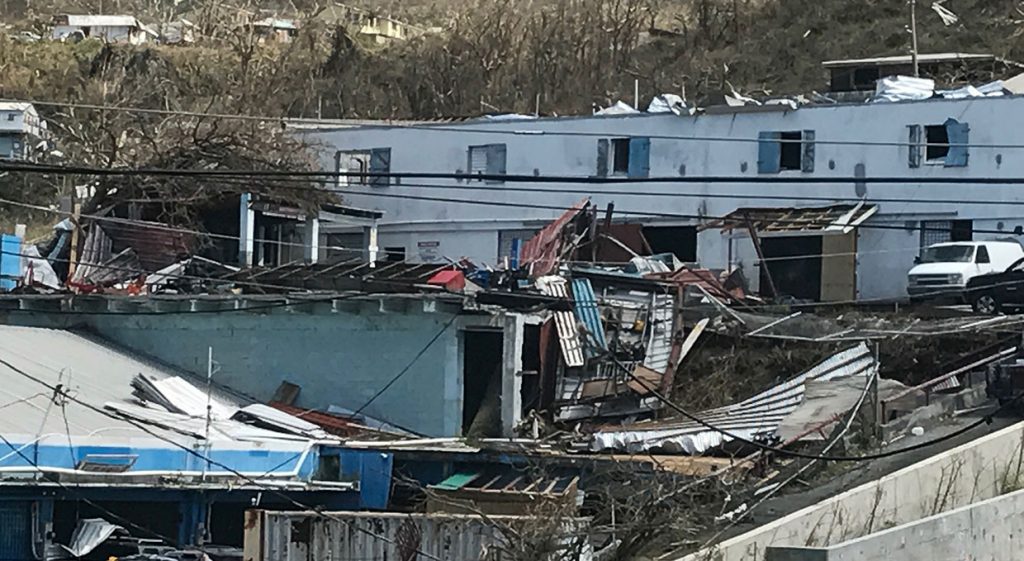No Indians were injured or killed in the two Category 5 hurricanes that devastated the U.S. Virgin Islands this month, but several have lost their homes and virtually the entire island is crippled without power.
Pash Daswani, president of the India Association of the Virgin Islands, said: “Although there were other fatalities on the island, no Indian perished. We were very blessed.”
The 133-square-mile island was walloped by Hurricane Irma on Sept 7 and two weeks later by Hurricane Maria, killing three people. Nearly 30 people were killed in the Caribbean during the two hurricanes.
Flooded streets in the Virgin Islands.
Homes Open to the Ocean
Daswani said Irma was more destructive for the infrastructure of the islands, but Maria brought down whatever remained. The hospitals on St Thomas and St Croix, the most populated islands, were paralyzed and will likely have to be torn down, according to the Gov Kenneth E Mapp. The island, which is home to 103,000 residents, relies on ports 40 miles east in Puerto Rico, which is itself a disaster zone, for most supplies. The Virgin Islands are running dangerously low on fuel, food supplies and water and officials are warning of an impending catastrophe.
Many Indians lost their homes, Daswani said, with roofs and in some homes the entire side walls ripped off. “There are no sides to their houses,” he said, “They are looking at the ocean or the sky.”
Daswani, who has lived on the island for 35 years where he owns a jewelry store, said the airport has been crippled. His 22-year-old son has cerebral palsy and the family caught a charter flight almost a week after Hurricane Irma to Florida. Since major hospital services are out of operation, the government is evacuating at-risk patients to the mainland.
Many Indians in the Virgin Islands own retail jewelry, souvenir and tourist shops to service visitors, the vast majority of whom arrive on cruise ships. But with air and sea transport cut off, it will be months before the Virgin Islands see tourists again. Although many cruise lines have announced that they will not be making port calls for the rest of this year, Gov. Mapp is hopeful that they will begin operating to the island “probably by the third week in October,” joking that “part of the new excursion is to see the disaster.”
“Trust me,” he told business community members jittery over the impact of tourism, the linchpin of the island’s economy, at a public meeting on Sept. 26, “the hurricane disaster will become folks’ experience.”
A majority of Indian stores are located on Main Street and Havensight Mall in St Thomas, which currently have power, Daswani said, but most homes remain cut off from electricity or water supply. Cell and communications services are spotty on the island.
The airport in St Thomas, Virgin Islands, has been crippled. Photos: Courtesy Pash Daswani
D. V. Singh, consul for community affairs at the Consulate General of India in Atlanta, said: “We have set up a 24/7 helpline. We are in regular touch with the community associations and leadership in Puerto Rico and U.S. Virgin Islands and we are ready to provide all possible help to all Indian citizens and even PIOs.”
He added that Indians in the islands are “safe and sound” and thus far the consulate had not received any requests for assistance.
The Virgin Islands are home to an estimated 1,000 Indians. Daswani said that nearly 600 of them, or about 200 families, are members of the association, which is assisting people “regardless of whether they are members, because in times like this we need to help everyone who needs help.”
He is hopeful that after Pres Donald Trump issued a disaster declaration for the U.S. Virgin Islands authorizing federal assistance, more U.S. troops and relief will be heading to the islands. “Even though the federal government, FEMA (Federal Emergency Management Assistance), NYPD (New York Police Department) are all down there, I can tell you, recovery is going to take not months, but years,” he warns.
